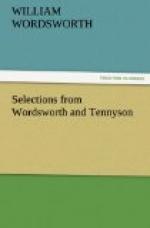23. THO’ MERLINE SWARE—AGAIN. Merlin was the great wizard of Arthur’s court. In the allegorical view of the poem he typifies the intellect, or, in Tennyson’s words: “the sceptical understanding.”
This prophecy concerning Arthur is again referred to in The Coming of Arthur:
And Merlin in our time
Hath spoken also, not in jest, and sworn,
Though men may wound him, that he will
not die,
But pass and come again.
This belief is common to all the Arthurian sources. Compare, for example, Wace’s Brut: “Arthur, if the story lies not, was mortally wounded in the body: he had himself borne to Avalon to heal his wounds. There he is still; the Britons await him, as they say and understand . . . The prophet spoke truth, and one can doubt, and always will doubt whether he is dead or living.” Dr. Sykes writes that, “The sleep of Arthur associates the British story with the similar stories of Charlemagne and Frederick Barbarossa of Germany, Brian in Ireland, Boabdil el Chico in Spain, etc.”
27. EXCALIBUR. Arthur’s magical sword. It is described in The Coming of Arthur, ll. 295 f., as:
the sword
That rose from out the bosom of the lake,
And Arthur rowed across and took it—rich
With jewels, elfin Urim, on the hilt,
Bewildering heart and eye—the
blade so bright
That men are blinded by it—on
one side,
Graven in the oldest tongue of all this
world,
“Take me,” but turn the blade
and ye shall see,
And written in the speech ye speak yourself,
“Cast me away.”
It has been variously held that Excalibur typifies temporal authority, or spiritual power. The casting away of the sword, therefore, represents the inevitable change in which human things are involved, and even faith itself. Compare Morte d’Arthur, ll. 240-241.
Magical weapons and enchanted armour are a portion of the equipment of almost all the great legendary heroes. Their swords and their horses usually bear distinctive names. Roland’s sword was Durandal, and Charlemagne’s was Joyeuse.
37. FLING HIM. The sword is viewed as possessing life.
THE MIDDLE MERE. Compare a similar classical construction in Oenone, l. 10, topmost Gargarus.
53-55. THE WINTER MOON—HILT. The frosty air made the moonlight more than usually brilliant.
60. THIS WAY—MIND. An echo of Vergil’s line, Aeneid, VIII. 20. Atque animum nunc huc celerem, nunc dividit illuc. “And he divides his swift mind now this way, now that.”
63. MANY-KNOTTED WATER FLAGS. Dr. Sykes has a careful note on this expression (Select Poems of Tennyson; Gage & Co.). “The epithet many-knotted is difficult to explain. The possible explanations would refer the description to (1) the root-stock of the flag, which shows additional bulbs from year to year; (2) the joints in the flower stalks, of which some half-dozen may be found on each stalk; (3) the large seed-pods that terminate in stalks, a very noticeable feature when the plant is sere; (4) the various bunches or knots of iris in a bed of the plants, so that the whole phrase suggests a thickly matted bed of flags. I favour the last interpretation, though Tennyson’s fondness of technical accuracy in his references makes the second more than possible.”




